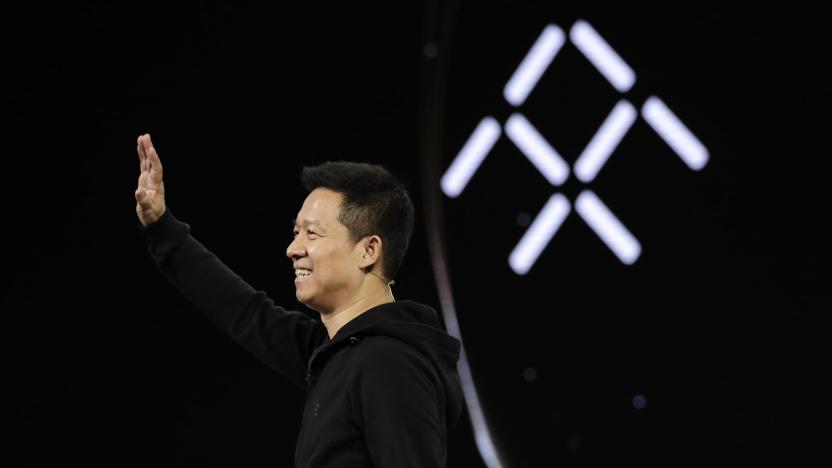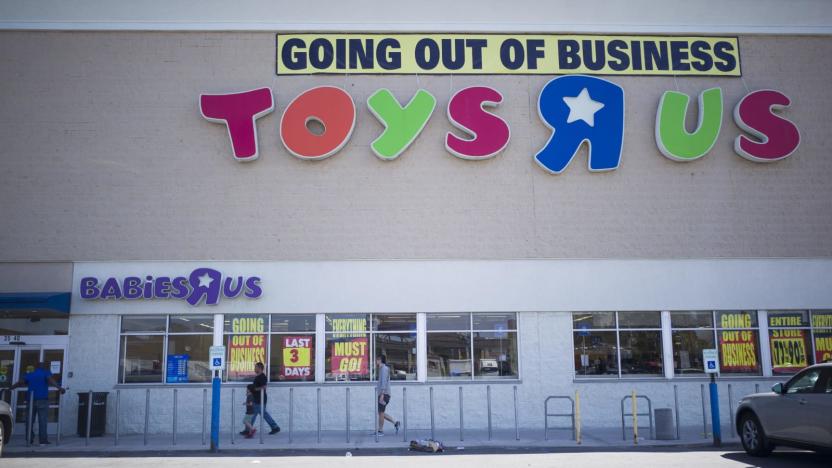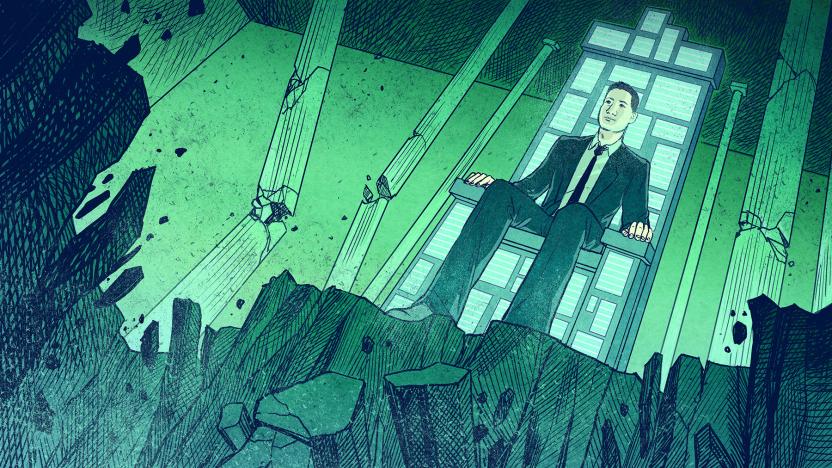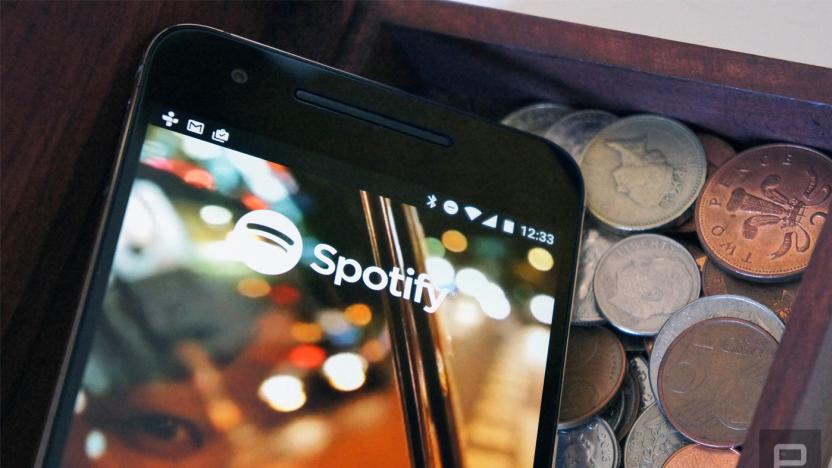debt
Latest

HBO Max can't come fast enough for AT&T
If AT&T's convoluted TV streaming options didn't convince you that the company was struggling, maybe its Q3 earnings will. According to the latest earnings report, released today, the company's revenue dropped 2.5 percent, with Warner Media revenue falling 4.4 percent, in the third quarter. It lost 1.2 million premium TV subscribers, and AT&T Now lost nearly 200,000 subscribers.

Faraday Future founder files for Chapter 11 bankruptcy
Faraday Future founder Jia Yueting has filed for Chapter 11 bankruptcy in a bid to settle his exorbitant personal debts. The move is part of a larger recovery plan, and it's meant, in part, to regain credibility for Faraday Future. Though there's no guarantee that it will help.

Toys 'R' Us could make a comeback?
After entering Chapter 11 protection last fall, Toys 'R' Us announced in the spring that it would sell off international operations and shut down in the US. Now, its top lenders -- the billions of dollars in debt it carried did more to kill the chain than millennials or Amazon ever could -- have cancelled an auction that would've sold off the Toys 'R' Us and Babies 'R' Us names as well as some associated toy brands. Instead they're working on a plan to revive the names, which they have ownership over everywhere except Canada. Now Geoffrey LLC. will own "trademarks, ecommerce assets and data" so we'll see if it actually turns into a store or if we just end up getting targeted ads based on gifts purchased eight Christmases ago. With the holiday season approaching, many of the 33,000 workers laid off are still fighting to see any severance pay. Last week, the Wall Street Journal reported that private equity firms Bain and KKR were putting together a fund to pay them.

MoviePass tries a financial Hail Mary to keep itself afloat
There's no doubt about it: MoviePass is bleeding cash, and there's no guarantee that a growing subscriber base or investors (who are increasingly jittery) will keep it going. And that, in turn, is leading it to consider more drastic measures. MoviePass parent company Helios and Matheson Analytics (HMNY for short) has filed a statement with the SEC to let it sell as much as $1.2 billion in equity and debt securities over the next three years. This doesn't guarantee that it will raise $1.2 billion, as TechCrunch mentioned -- rather, it would provide a new avenue for raising cash if it doesn't think other options are enough.

Inside LeEco's spectacular fall from grace
With additional reporting by Chris Ip and Richard Lai. Behind the doors of the five-star Bohao Radegast Hotel in Beijing's central business district on Monday, troubled Chinese tech conglomerate LeEco held an extraordinary shareholder's meeting to elect new directors. Outside, some two dozen protesters set up tables and held up signs asking to be paid what they were owed for services rendered. According to multiple reports, they had come from 20 cities all over China and were reportedly due about 33 million yuan (around $5 million) in all. Many of them demanded to see Jia Yueting, but the company's billionaire founder and public face was nowhere to be seen. LeEco's fall from grace has been spectacular. Once hailed as the "Netflix of China," the daring startup and its then-outspoken founder were bold enough to challenge Tesla and criticize Apple as "outdated." But in recent months, the company has faced a series of setbacks, and may be reaching its breaking point. Jia stepped down as chairman and CEO in May, while the company continues to fend off unhappy vendors who are protesting outside its Beijing headquarters. On the other side of the Pacific, LeEco has also massively scaled back its American operations, laying off hundreds of workers in the process, while facing two lawsuits from US TV maker Vizio. Faraday Future, a futuristic car company with close ties to LeEco, recently canceled its plans to build a $1 billion plant in Nevada as well. This is the tale of a company that grew too quickly. It shows how a ravenous appetite for growth without a solid financial foundation can cause a business to topple. Simply tracing LeEco's cash flow is a Herculean task, since its financial activity is obscured by a dizzying organizational structure comprising a publicly listed holdings company, privately owned organization and dozens of subsidiaries. It's incredible that LeEco was able to continue operations for as long as it did without getting into any real legal trouble. But since 2016, it has been slammed with several lawsuits. Manufacturing partners in Asia, including Zhejiang Haosheng Electronic Technology, Compal Electronics and Truly International Holdings have sued for outstanding debt. The most recent significant case was Vizio's $100 million claim for a failed $2 billion acquisition. From interviews Engadget conducted with unpaid vendors, former employees and investors, some of whom spoke on the condition of anonymity out of concern for their careers, it became apparent that LeEco's future may be in serious trouble.

Spotify bets on debt to fund expansion
Spotify has raised $1 billion in a deal onlookers have called "strict" and "devilish." Rather than another equity-based funding round, the money was raised through convertible bonds (i.e. debt), with some restrictive terms mostly tied to Spotify going public with an IPO. Investors will be able to convert their bonds to shares at a 20-percent discount within the next year. After that, if the IPO still hasn't happened, that percentage will increase by 2.5 percent every six months. Additionally, as it's debt, there's interest to pay -- 5 percent yearly, which similarly will increase every six months after a year, this time by one percent.

38 Studios loan under SEC investigation
It seems as though we can't go more than a few weeks without hearing about some new complication related to the collapse of 38 Studios and the financial catastrophe it left in its wake. This week's news comes in the form of an SEC probe into the $75 million in loan guarantees offered to the studio by the Rhode Island Economic Development Corporation. The RIEDC has secured the services of a law firm to help it handle the SEC's investigation. Further details are sparse, as the RIEDC has offered only that it "doesn't discuss ongoing matters related to 38 Studios and maintains a level of confidentiality as requested by the SEC." Strangely, the SEC investigation, which launched in early 2012, was not mentioned to investors when Rhode Island published financial documents related to a bond transaction in April of that year. According to the treasurer's spokesperson, the state's treasury was not aware of the probe at that time. The RIEDC is currently involved in a lawsuit against studio head Curt Schilling and former RIEDC members responsible for the 38 Studios deal.

Rhode Island set to pay 38 Studios bonds. Probably.
38 Studios collapsed upon itself in a heap of flaming disaster last year, and Rhode Island taxpayers ended up stuck with the bill. The state used a $75 million loan, acquired through the sale of taxable bonds, to convince 38 to operate within its borders, and RI is now on the hook for around $89 million after the studio declared bankruptcy. Some state lawmakers in Rhode Island flirted with the idea of "walking away" from the debt, which is apparently a privilege afforded to a government and not its citizens. However, the state's House Finance Committee has approved a budget that includes, at the very least, making an interest payment of $2.5 million on the debt in May 2014. If Rhode Island is running off the plan it talked about last month, this first payment will be followed by yearly payments of $12.5 million until the debt is repaid. The budget hasn't passed; it still needs to get through the state's House and Senate. Future interest payments will also have to be approved by the state legislature.

Rhode Island explores ditching 38 Studios debt
To pay back or not to back, that is the question that Rhode Island is exploring after being saddled with $112.6 million in combined debt and interest when 38 Studios went kaput, taking Project Copernicus with it. RI governor Lincoln Chafee still believes that lenders should get their due according to his spokeswoman Christine Hunsinger, but the administration is gathering data to explore the cost of not paying back to get an understanding of "the ramifications of what that decision would be." Currently the state is planning to pay investors back over the course of 10 years, with a $2.5 million payment the first year and subsequent installments of $12.5 million thereafter.

Kodak expects to exit bankruptcy in Q3 2013
Now with a patent sale, new financing and asset offloads under its belt, Kodak's homing in on when it might emerge from Chapter 11 bankruptcy. In January, the imaging giant predicted it might finally exit its financial default by mid-2013, and now it's filed paperwork with a New York court indicating it's on track to meet that goal sometime during its third quarter this year. In addition to the timeline update, the Plan of Reorganization and Disclosure Statement outlines how the firm's debts have been settled and its future plans, which place heavy emphasis on its commercial imaging business. A hearing for the document and associated strategy is anticipated to be scheduled in mid-June, and creditors will arrange a vote afterwards to decide if everything's to their liking. Kodak's certainly not out of the woods just yet, but it's plodding steadily towards the clearing. [Image credit: Viktor Nagornyy, Flickr]

Curt Schilling might pay back debt by selling baseball memorabilia
Curt Schilling is most recently famous for failing spectacularly at using loans from Rhode Island and investors to create a Kingdoms of Amalur MMO. As the founder of the now-bankrupt 38 studios and someone who personally guaranteed some $12 million worth of loans related to the studio, Schilling's lucky that he was famous for other stuff before stepping into game development. For example, Schilling was one of the best pitchers in American League baseball in 2004 and played for the Boston Red Sox, the only team in MLB history to win a seven-game series after losing the first three games. A bloody sock that he wore during that series is listed (along with World War II-era memorabilia, one of Lou Gehrig's baseball caps, his home, and a stake in a private equity firm) in a collateral filing.

OnLive's debt was $30-40 million, insolvency group reveals
It's now been revealed that OnLive's debt was somewhere between $30 million and $40 million before last week's collapse and subsequent reincarnation.Last week, the California-based company's assets were transferred to Insolvency Services Group. Those assets were then sold on to Lauder Partners, LLC on the day OnLive ceased operations. Yesterday, ISG's CEO Joel Weinberg revealed the extent of OnLive's arrears to San Jose Mercury News."It was a company that was in dire straits. It only had days to live in terms of cash flow and the like," Weinberg disclosed, "Something had to be done immediately or there would have been a hard shutdown, which would have been a disaster."The newly acquired company will continue to run under the OnLive name, but it had to lay off at least half of its 200 employees as part of the process. It now also appears likely that investors HTC and British Telecom will write off their investments. Weinberg also revealed that he expects investors to only receive 5 to 10 cents per dollar owed.

Best Buy founder wants slashed prices, Apple-style customer service in $10 billion rescue plan
Best Buy founder Richard Schulze is proposing a plan to turn around the ailing electronics store as part of a $10 billion buyout. He's proposing the retailer slashes prices to compete with online rivals like Amazon, while offering Apple Store-levels of customer service. He's concerned that the current closure and size-reduction policy will spell the end of the business, which is rumored to announce another round of closures shortly. It's yet to be seen if his plan, which would mean running Best Buy at a loss for several years, would be accepted by the company's management, who are meeting to discuss the proposals at the end of the month.

Dish Network rumored to have bought Clearwire's $400 million debt in secret transaction
We're not in the habit of entering the dry world of corporate debt notes, but Sprint's latest financial release might disguise a juicy bit of news. There's a rumor in the business press that Dish Network might have bought around $400 million of Clearwire's debt -- helping relieve the pressure on Sprint, which has been keeping its subsidiary alive on handouts. Unsurprisingly, no-one's commenting on the rumors, although Dish CEO Joseph Clayton did say he was open to a partnership (or acquisition) with Sprint / Clearwire late last year. If true, it could signal that it's getting ready for a fight against AT&T -- or maybe it just wanted to throw Dan Hesse a bone.

LightSquared officially files for Chapter 11 bankruptcy
As expected, May 14th is indeed a dark day for LightSquared. The company has just filed paperwork in order to initiate Chapter 11 bankruptcy proceedings in Manhattan's US Bankruptcy Court, effectively killing its dream of providing a high-speed mobile wireless network to upwards of 260 million people. Not quite a year after Sprint and LightSquared put together an agreement that would ensure 15 years of blissful LTE enjoyment together, Philip Falcone's baby looks weaker than ever. With the Sprint tie-up now void, and over $1.6 billion in debt, there's probably not too many places for LS to turn. The primary hurdle -- one it never could seem to overcome -- was the FCC's outright refusal to believe any of the company's mitigation proposals in relation to GPS interference issues. Despite "profoundly disagreeing" and raising all sorts of chaos in an effort to get its way, LightSquared never did manage to convince the powers that mattered. Where it turns from here is anyone's guess, but it won't be a quiet fall from grace, we're surmising.

WSJ: LightSquared 'preparing' for bankruptcy protection filing, final decision coming tomorrow
Can't say it's striking us as any sort of surprise, but the seemingly destined-to-fail LightSquared just might be out of options. After getting a high-five from Sprint and plenty of attention for its initiatives in bringing yet another wireless option to America, those blasted GPS interference issues (or "supposed" issues, depending on who you ask) eventually became too much to overcome. According to a breaking report out of The Wall Street Journal, Philip Falcone's venture is seriously teetering on the edge of bankruptcy, as "negotiations with lenders to avoid a potential default faltered," according to the ever-present "people familiar with the matter." Purportedly, the two sides have until 5PM tomorrow to strike a deal that'll keep the firm out of bankruptcy court (if you'll recall, it owes over $1.6 billion dollars to various entities), but given just how far apart these sides remain, its fate seems all but sealed. We'll be keeping an ear to the ground for more, but don't go placing bets on yet another debt-term violation waiver.

Carl Icahn unloads his LightSquared debt, creditor talks trudge on
Carl Icahn is no stranger in this field -- he's been caught tussling with Motorola and bidding Yahoo's board adieu in recent years -- and most recently, he's managed to get caught up in one of the bigger wireless whirlwinds this planet has ever seen. Just months after Icahn swooped in to buy some $250 million in company debt at around 40 cents on the dollar, he has managed to offload that very chunk for 60 cents on the dollar. Not surprisingly, his cash coffers are growing in turn, despite LightSquared's position as a whole looking only marginally less bleak. According to a Reuters report, creditors have agreed to another week-long extension (until May 14th) in order to talk things over with head honcho Philip Falcone. As of now, the startup has around $1.6 billion in debt, and while talks may delay the pain, we're still not getting the impression that the FCC (or anyone else, really) is warming to its propositions. Then again, maybe Facebook can just buy it in an act of charity prior to its IPO.

Sprint raising $2 billion, may throw some dough Clearwire's way
Sprint is looking to sell $2 billion in notes to raise cash, a large chunk of that likely earmarked for network upgrades. The money will come in handy too, as making the leap from WiMAX to LTE won't be cheap. Then, there's its partner Clearwire. After Sprint's board shot down a quest to snatch up MetroPCS, the carrier is even more reliant on the former WiMAX champion -- a company that just saw Google announce plans to dump its shares at a $450 million loss. According to Bloomberg, Sprint may take some of the $2 billion it plans to raise and use it to prop up Clear, which is making the transition to TD-LTE. At this point, we're beginning to think the carrier's cash infusions are the only thing keeping the wireless wholesaler going.

Elpida files for bankruptcy protection as debts of $5.5 billion are revealed
DRAM Maker Elpida has petitioned for a corporate reorganization (the equivalent of Chapter 11 or Administration) as the company has revealed it is close to collapse. President Yukio Sakamoto is expected to resign as the scapegoat for the calamity as it files for protection at the Tokyo District Court. The company, founded in 1999 as NEC Hitachi Memory Inc. has produced DRAM Products since 2000. It founded three wholly-owned subsidiaries: Tera Probe, which conducted wafer probe testing, Akita Elpida Memory Inc. which handled the back-end processes of DRAM production and Rexchip Electronics Corp, which handled the front-end. After a blockbuster period of invention, a fall in prices and the global recession in 2006 forced the company to enter restructuring with a 30 billion Yen ($372.54 million) Government-backed loan. That swathe of cash was used to pump more money into investment and R&D, but the combination of strong Yen and the Thailand flooding has once again forced the company to come clean about its finances. It revealed today that it had debts of 448,033 million Yen, or $5.5 billion and without the protection of the court wouldn't last too much longer. Times of Japan points to the strength of Samsung's memory offerings as being a big contributor to Elpida's collapse, with president Sakamoto saying that DRAM is now as cheap as a "rice ball."

Carl Icahn smells blood in LightSquared's spectrum, descends to feed on its carrion
Oh, the twisted web that continues to weave itself around LightSquared. After incurring a seemingly endless parade of regulatory and industry obstacles, the Philip Falcone-backed network is now facing yet another potential hurdle. Except this time, it's taken the shape of investor Carl Icahn: a business magnate notorious for swooping in on downtrodden companies (see: Time Warner) and seizing control. And it appears the old man's pulled out his tried-and-true bag of tricks, securing a sizeable chunk of the fledgling 4G operation's debt following a value drop last year. What does this spell for Falcone? Well, the move could wind up positioning Icahn as a controlling force, steering the LTE operation away from its hedge fund founder's vision and into more profitable waters -- a welcome turn of events for the cash-strapped company. With FCC approval still pending, Sprint quietly retreating from its partnership deal and a looming fight for executive control, it's safe to say LightSquared's troubles have only just begun.[Image credit: Sarah A. Friedman]












